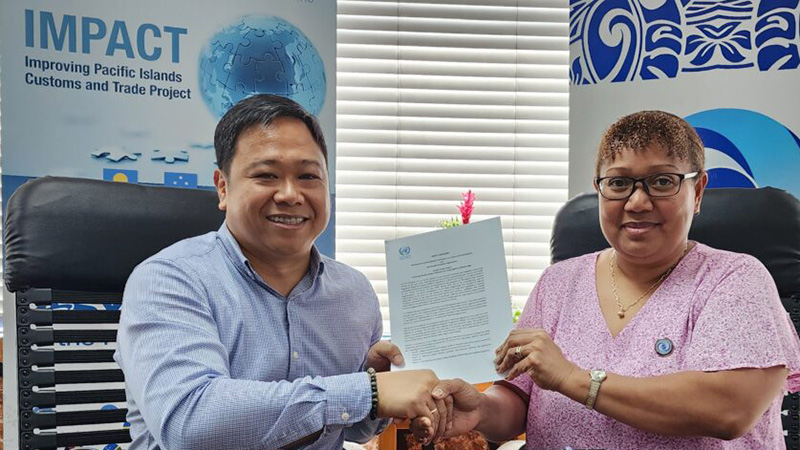The Pacific Region is grappling with trade and economic challenges exacerbated by geographical isolation and vulnerability to disasters. While there have been policy reforms over the last decade to facilitate trade and improve competitiveness, the region still falls below the Asia-Pacific average in these aspects, primarily due to limited resources.
Currently, efforts are underway to improve trade facilitation, with certain Pacific countries working towards establishing National Single Windows, backed by international agreements like the Economic Partnership Agreement (EPA) with the European Union, aiming to enhance trade integration and cooperation on customs issues. However, further efforts are necessary to streamline trade-related legislation and meet global trade commitments, enabling sustainable economic development and integration into global value chains.
Objectives and expected results
The IMPACT project is itself part of the Pacific Regional Integration Support (PRISE) program, which aims to increase the quality and the volume of goods traded intra-regionally between the 15 Pacific Island countries and internationally, including with the European Union’s 27-member States.
The specific objective is to improve trade facilitation and border management, and harmonise customs procedures.
To achieve the project objectives, IMPACT will deliver the following Results:
-
Improved ability to benefit from WTO priority measures
Assist countries in the Pacific ACP region comply and benefit from trade facilitation reforms, in particular with regard to Category C provisions of the World Trade Organisation’s Trade Facilitation Agreement.
-
Harmonise Customs operations across the Pacific ACP region
Harmonisation of customs operations across all countries including extending the range and scope of customs management systems (including the deployment of the Automated System for Customs Data [ASYCUDA] in the Federated States of Micronesia, Marshall Islands, and Palau), improving Electronic Data Interchange (EDI) between traders and Customs leading to greater speed and efficiency in port handling and generating trade data that can be used for statistical economic analysis.
-
Define requirements for National Single Window systems, and guidelines prepared
The project will support ongoing efforts in Fiji, Papua New Guinea, Timor-Leste and Vanuatu to establish a Single Windows systems and will work closely with Samoa, Tonga and Solomon Islands to create pathways for its establishment as a precursor to rollout across the region.
-
Strengthened technical understanding, leadership and statistical capacity
Capacity building to strengthen technical understanding, leadership, as well as statistical capacity to drive further customs reform, including of regional bodies Oceania Customs Organization.
Link to the SDGs
IMPACT is relevant for the 2030 Agenda for Sustainable Development and contributes primarily to the progressive achievement of SDG 8: Promote strong, inclusive and sustainable economic growth and decent work for all, and SDG 12: ensuring sustainable consumption and production patterns.
It also addresses important aspects of SDG Goals: 1, 5, 9, 10, 13, 14, and 15.
Monitoring and Evaluation
IMPACT follows UNCTAD’s core principles and methodology for measuring gender equality in trade. This will help countries identify what data is required, organize statistics in a useful way and identify gaps.



